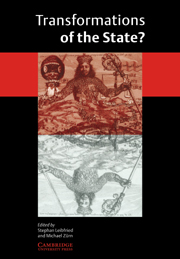Book contents
- Frontmatter
- Contents
- A new perspective on the state
- 1 Reconfiguring the national constellation
- The modern territorial state: limits to internationalization of the state's resources
- The rule of law: internationalization and privatization
- The democratic nation state: erosion, or transformation, of legitimacy
- The intervention state: the shifting welfare component
- Index
1 - Reconfiguring the national constellation
Published online by Cambridge University Press: 04 August 2010
- Frontmatter
- Contents
- A new perspective on the state
- 1 Reconfiguring the national constellation
- The modern territorial state: limits to internationalization of the state's resources
- The rule of law: internationalization and privatization
- The democratic nation state: erosion, or transformation, of legitimacy
- The intervention state: the shifting welfare component
- Index
Summary
The influence of the state on the trajectory of human lives is more comprehensive and sustained than that of any other organizational construct. We provide a definition of the modern nation-state in four intersecting dimensions – resources, law, legitimacy, and welfare – and review the history and status of each dimension, focusing on the fusion of nation and state in the 19th century, and the development of the ‘national constellation’ of institutions in the 20th. We then assess the fate of the nation-state after the Second World War and, with western OECD countries as our sample, track the rise and decline of its Golden Age through its prime in the 1960s and early 1970s. Finally, we identify the challenges confronting the nation-state of the 21st century, and use the analyses in the following eight essays to produce some working hypotheses about its current and future trajectory – namely, that the changes over the past 40 years are not merely creases in the fabric of the nation-state, but rather an unravelling of the finely woven national constellation of its Golden Age. Nor does there appear to be any standard, interwoven development of its four dimensions on the horizon. However, although an era of structural uncertainty awaits us, it is not uniformly chaotic. Rather, we see structured, but asymmetric change in the make-up of the state, with divergent transformations in each of its four dimensions.
- Type
- Chapter
- Information
- Transformations of the State? , pp. 1 - 36Publisher: Cambridge University PressPrint publication year: 2005
- 14
- Cited by



